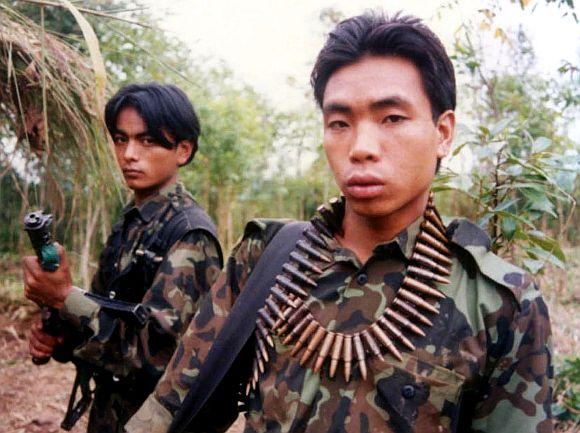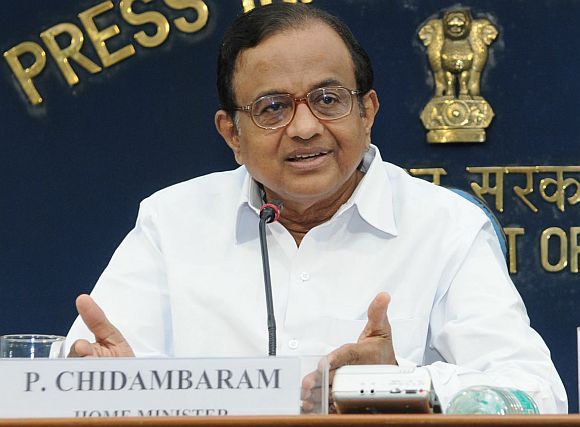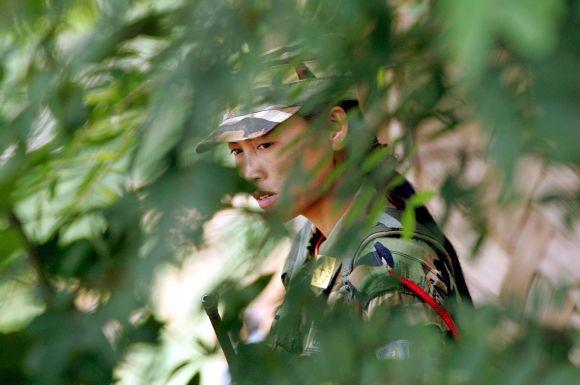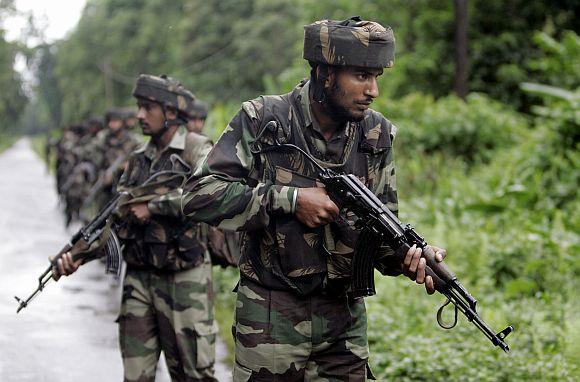
Maoist activities in Assam are likely to receive the support of the so-called anti-talks faction of the ULFA and if not nipped in the bud will spread to other states of the Northeast with support from other insurgent groups and international powers, warns Col Anil Bhat (Retd).
The latter part of May 2012 saw Assam gearing up security following the so-called anti-talks faction of United Liberation Front of Asom's 'welcome programme' for Congress president Sonia Gandhi's visit to the state.
Its call for a bandh and threats of unleashing terrorist violence were to make its presence felt and to show its strength, as the flow of funds to its coffers has been down owing to majority of the people receiving extortion demands from the outfit refusing to pay up.
While timely recovery of explosives may have foiled some earlier attempts to target oil pipelines and other installations, two disturbing trends have emerged. The first is of Maoists spreading to the Northeast. The second pertains to reports of many of the terrorist groups of the region re-uniting.
Please ...
Col Anil Bhat (Retd) is editor, WordSword Features & Media and a defence analyst based in New Delhi
Powered by

Both Union Home Minister P Chidambaram and Assam Chief Minister Tarun Gogoi have acknowledged the fact that Maoists are making inroads into the region. Addressing the chief ministers' conference on internal security on April 16, Chidambaram stated that Assam had emerged as the new theatre of Maoist activity and there were also inputs about links of CPI (Maoist) with insurgent-turned-terrorist groups in Manipur and Arunachal Pradesh.
Again on May 12, while on a tour of Arunachal Pradesh, he stated, "There will be no compromise with the Maoists trying to destabilise peace in the region and police have been instructed to take stern action. The Centre was alive to the situation created by such groups in the region and was taking concrete steps to curb them".
Reports indicate that the Maoists have received arms, ammunition, explosives and other equipment as well as training by the Northeastern groups. By late 2009, it is believed that consignments of weapons by arrangement with China amounting to 850 AK-47 rifles, 4,000 small weapons and several hundred grenades, were supplied to the Maoists through Burma and Bangladesh by an elaborate network run in the Northeast by the National Socialist Council of Nagaland (Isak-Muivah).
The arrest on April 8 by the National Investigating Agency of Arnold Singh alias Bekon, a hard core member of the Chinese Peoples Liberation Army points to linkages between the Maoists and the PLA.
As per official sources, Arnold had led a four member team of the PLA to Jharkhand where they imparted training to several batches of Maoist rebels. This also indicates attempts at outreach by Northeast terrorist groups well away from their respective states. The PLA of Manipur has major links with Pakistan's Inter-Services Intelligence in Bangladesh and also has bases in a number of Northeastern states too.
On May 9, Assam police claimed to have killed four unidentified Maoists activists in an encounter at Deopani Borgora Nepali Gaon near Buraburhi Than under Chapakhowa police station of Sadiya in Tinsukia district. Police recovered two AK-47 rifles, one AK-56 rifle, 3 live grenades, 53 rounds of live ammunition, a detonator and several extortion demand notes from them.
While this operation by Assam police was successful, it exposes only a tip of the iceberg. The fact that there are ethnic Assamese being identified as Maoists means that the process of recruiting Assamese into their organisation has progressed.
Chief Minister Gogoi is reported to have directed top state officials to immediately prepare an action plan for setting up a task force to contain increasing Maoist activities. This would be formed under an additional director general of police to contain Maoist activities and counterfeit currency racket in the state.
"Maoist activities" in Assam are likely to receive the support of the so-called anti-talks faction of the ULFA and if not nipped in the bud will spread to other states of the Northeast with support from other insurgent groups.

Another major development is that of insurgent attempts at unity by bringing together fourteen terrorist groups of the region. An agreement was signed by them in 2011 to form yet another joint forum which they claim is already in place, but not yet been given a new name and will be different from similar efforts in the past.
ULFA, NSCN-K and PLA of Manipur have played a crucial role in forming this group, which includes United National Liberation Front, the three factions of People's Republican Party of Kangleipak (Prepak), the Noyon group of Kangelipak Communist Party (KCP), Kanglei Yawol Kanna Lup (KYKL), National Liberation Front of Tripura (NLFT), All Tripura Tigers' Force (ATTF), Hynniewtrep National Liberation Council (HNLC) and Garo National Liberation Army (GNLA).
The outfits will coordinate their activities and share information on operations and sources of weapons. Many of these groups have been supported by the ISI and also by China.
If this comes about, its neutralising would impose new challenges especially if there are also linkages with the Maoists. External support from China and the ISI will further muddy the waters and would necessitate a complete makeover of state and central police if the army is to be kept out of the ambit.
This will involve substantially increasing the numbers of the force, providing it good training at institutes like Counter Insurgency and Jungle Warfare School at Vairengte, Mizoram, providing better weapons, communications and mobility and most important, dynamic leadership. Even if all this is achieved, political will to disregard political connections and vote-bank interests will be needed to strike at the roots of these terrorist groups.

In February this year, Rajeev Bhattacharyya, working for a Northeast media publication, spent a few days in an ULFA camp set up in Eastern Nagaland. The location was ideal in that it was contiguous to Nagaland and Manipur, was in close proximity to Myanmar, only a few days walk from Upper Assam and well connected by rivers and jungle pathways, making the delivery of weapons and supplies easy.
In that camp he witnessed a huge consignment of European 9mm pistols and HK33 assault rifles being delivered. Though Heckler and Koch do not make the HK33 anymore, variants of the rifle are produced under licence in some south Asian countries. Once the consignment was unpacked, young cadres test-fired the guns before putting them into storage.
Sources were cited that orders were being placed for the Chinese Type 81 rifles and the American M16 -- both in the price range of Rs 2 lakh to 3 lakh. Interestingly, "concessional rates" apply for bulk orders and the United Front benefits from slashed rates. Medicines, food and goods not available in Myanmar are smuggled in from China and Thailand.
Another ominously significant event he witnessed was a soccer match, in which Paresh Baruah's blue team comprising cadres from ULFA, the National Democratic Front of Bodoland (NDFB) and the NSCN-K played against the opposing blue team made up of Manipuri terrorist groups.
Paresh Baruah's open show of solidarity with China is also a cause of concern. An email statement sent to an Assam portal condemned anti-China moves from the soil of Asom, claimed "good diplomatic ties" with the People's Republic of China and ranted against Indian government 'secretly setting up nuclear missile bases in North East India, especially in Assam' which would be detrimental to Assamese interests.
With Bangladesh-based ULFA leaders having extended their connections to China, supply of arms from Yunan province of southern China through insurgents in Burma has become another new route. The security situation hence needs to be carefully monitored.
...